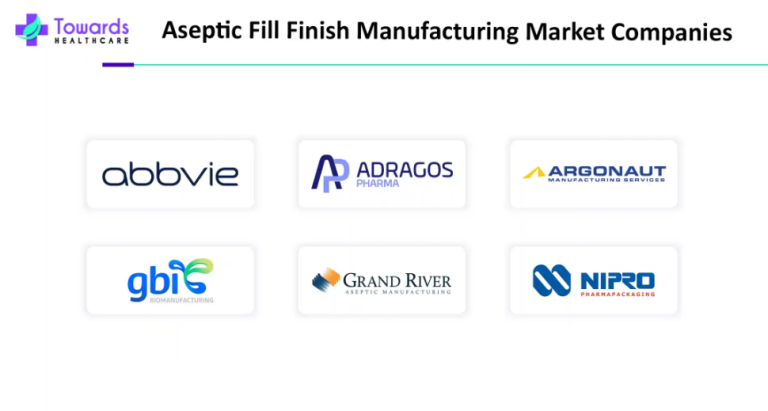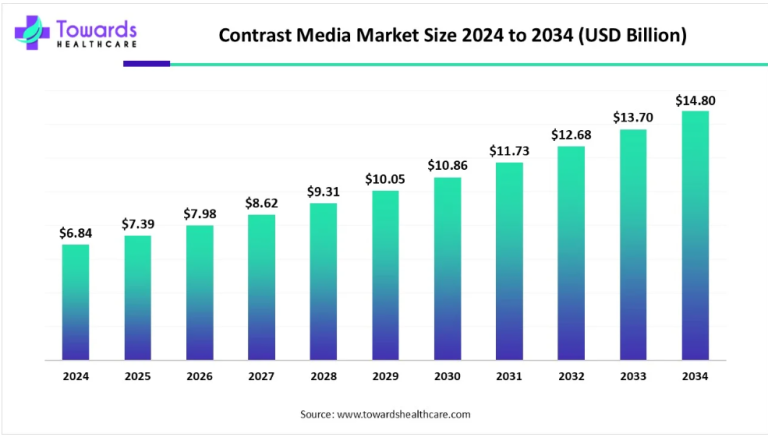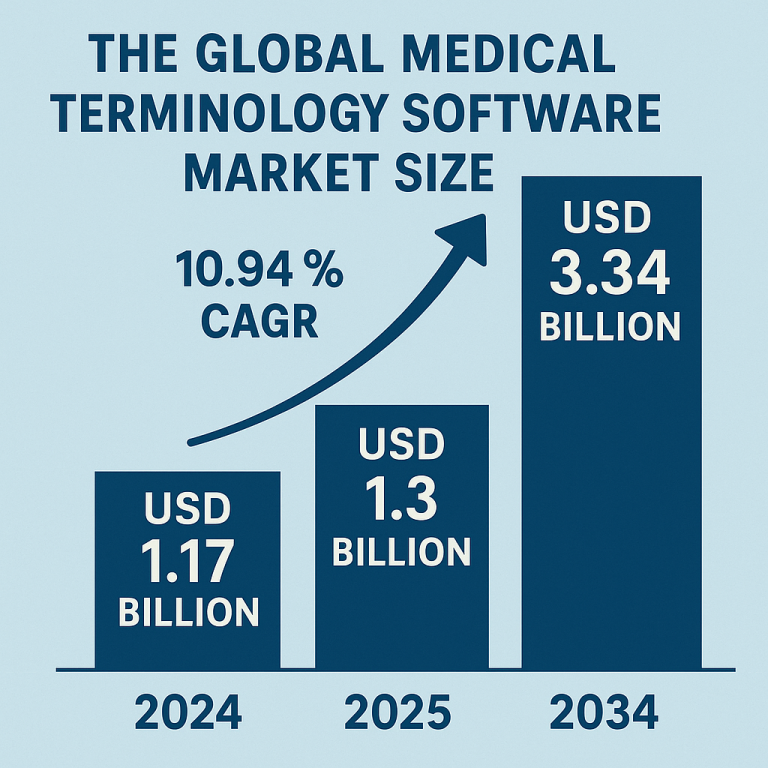In the dynamic landscape of digital healthcare, chatbots for mental health and therapy market are revolutionizing the way we approach well-being. Discover the remarkable trajectory of this transformative technology, from its humble beginnings to a projected market value of over USD 6.51 billion by 2032.
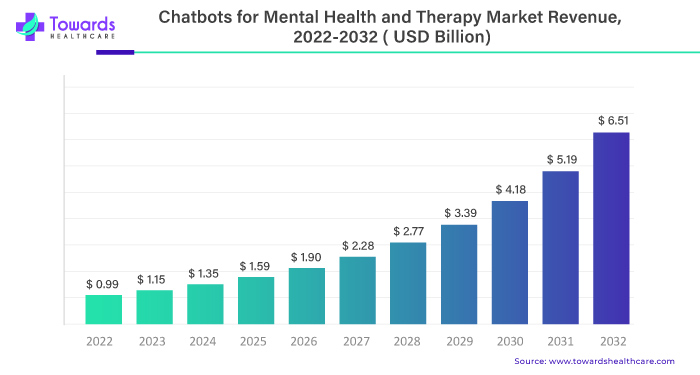 Join us as we delve into the driving forces behind this exponential growth and the pivotal role it plays in meeting the escalating demand for accessible and convenient mental healthcare services.
Join us as we delve into the driving forces behind this exponential growth and the pivotal role it plays in meeting the escalating demand for accessible and convenient mental healthcare services.
Chatbots For Mental Health and Therapy Market are playing a massive role in improving mental health
The market for chatbots for mental health and therapy market is experiencing significant growth as the demand for accessible and convenient mental healthcare solutions continues to rise. Chatbots, powered by artificial intelligence (AI), are computer programs designed to simulate human conversation and provide support, guidance, and therapeutic interventions for individuals facing mental health challenges.
The market is driven by several factors, including the increasing prevalence of mental health disorders, limited access to mental healthcare professionals, and the growing acceptance and adoption of digital health technologies. Mental health conditions such as depression, anxiety, and stress-related disorders affect millions of people worldwide, creating a need for scalable and cost-effective solutions.
Chatbots offer several advantages in the field of mental health and therapy. They provide 24/7 availability, allowing individuals to seek support and guidance at any time. Chatbots can engage in personalized conversations, deliver evidence-based interventions, and provide psychoeducation to users. They can also monitor symptoms, track progress, and offer resources for self-help and self-care.
Rise in Demand for Accessible and Convenient Mental Healthcare Services
The increasing demand for accessible and convenient mental healthcare services is a major driver in the chatbots for the mental health and therapy market. Traditional mental healthcare services often face barriers that hinder individuals from accessing timely support when they need it most. Chatbots address these barriers by providing immediate access to mental health support. They can be accessed through various digital platforms, including smartphones and web-based applications, allowing users to engage in conversations from the comfort and privacy of their own homes. This convenience and accessibility make chatbots attractive for individuals seeking mental health support.
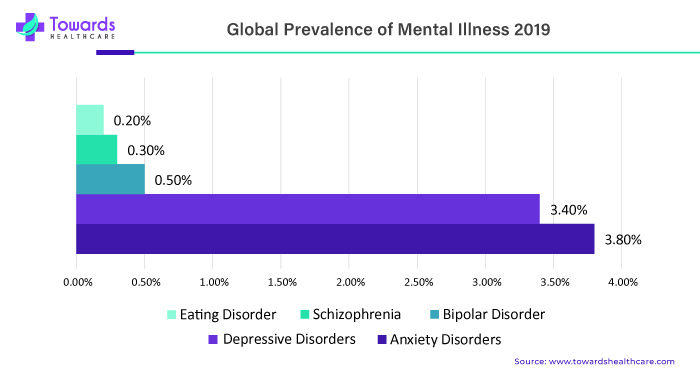
Due to the rise in the demand for mental health services, there is increased investment in the development of advanced chatbots for mental health and therapy market. For instance, in March 2021, Wysa Ltd, a mental health app company closed a Series A funding round of $5.5 million run by Boston’s W Health Ventures, the Google Assistant Investment Program, pi Ventures, and Kae Capital. In addition, the company raised around $20 million in a series B funding round to expand its business capacity, in July 2022. Furthermore, the increasing prevalence of mental health disorders significantly increases the adoption of chatbots for mental health and therapy market. According to the WHO 2020 estimates, depression is the leading cause of disability in the world, and around 264 million people across the globe suffered from depression in 2020. The COVID-19 pandemic also accelerated the case of mental health issues across the globe. According to a Lancet publication, the pandemic triggered 76 million cases of anxiety and 53 million cases of depression worldwide.
Pioneering Progress: The Current Landscape
In 2022, the global market size for mental health and therapy chatbots stood at a commendable USD 0.99 billion. Fast forward to the horizon of 2032, and projections indicate an awe-inspiring compound annual growth rate (CAGR) of 21.3%. This meteoric rise is a testament to the transformative impact these digital companions have on the mental health sector.
Meeting the Demand: The Catalysts of Growth
1. Accessibility Redefined
Mental health chatbots serve as virtual gateways to support, providing immediate assistance at users’ fingertips. The surge in demand is intricately linked to the unprecedented accessibility these chatbots offer, breaking down traditional barriers to mental health services.
2. Convenience at Scale
In our fast-paced world, convenience is key. Mental health chatbots seamlessly integrate into users’ daily lives, offering on-the-go support and therapeutic interventions. This amalgamation of accessibility and convenience propels the market forward, catering to the needs of individuals seeking flexible and discreet mental health solutions.
3. Technological Advancements
The relentless march of technology has ushered in a new era for mental health interventions. Advanced algorithms and machine learning capabilities empower chatbots to provide personalized and effective support, further amplifying their efficacy. As technology continues to evolve, so does the potential for chatbots to become indispensable tools in mental health management.
Moreover, the use of chatbots can help overcome the stigma associated with mental health. Some individuals may feel uncomfortable or hesitant to seek help from traditional mental healthcare providers due to perceived judgment or discrimination. Chatbots offer a non-judgmental and confidential space for individuals to express their concerns and receive support without fear of stigma.
The Role of Advancement in NLP and ML Algorithms
Another major driver in the chatbots for the mental health and therapy market is the advancements in natural language processing (NLP) and machine learning algorithms. NLP allows chatbots to understand and interpret human language, enabling them to engage in meaningful conversations and provide appropriate responses. Machine learning algorithms enable chatbots to continuously learn and improve their responses based on user interactions and feedback. As more individuals engage with chatbots and provide input, the algorithms can adapt and refine their capabilities, making the interactions more personalized and effective.
These advancements in NLP and machine learning have led to the development of more sophisticated and intelligent chatbots for mental health and therapy market. Chatbots can now detect and analyze sentiment, identify key concerns, and provide tailored interventions based on the user’s specific needs. This personalized approach enhances the user experience and increases the effectiveness of the interventions.
In addition, the rise in product launches by major market participants augments the growth of the mental health and therapy market.
- In July 2023, the Osmania Technology Business Incubator (OTBI) and startup Findhope joined forces to organize the grand finale of the Ideathon. The objective of this event was to create a chatbot named Khushi, powered by AI, with the purpose of enhancing students’ mental well-being.
- During the COVID-19 pandemic, the Department of Psychiatry at Siriraj Hospital’s Faculty of Medicine and the Faculty of Engineering at Mahidol University jointly developed the chatbot “Psy Jai” to support mental health and emotional well-being.
Thus, advances in and innovations in chatbot services intended for mental health and therapy, add to the growth of this market.
Furthermore, advancements in NLP and ML algorithms offer significant potential in improving the capabilities of chatbots for mental health and therapy market. By enabling a better understanding of human language and personalizing the therapeutic experience, these advancements can enhance the accessibility and effectiveness of mental health support. However, ongoing research, ethical considerations, and continuous improvements are necessary to harness the full potential of these technologies in the context of mental health care.
Technology Limitations in Understanding Complex Human Emotions and Experiences
One of the major restraints in the chatbots for the mental health and therapy market is the limitations of technology in fully understanding complex human emotions and experiences. While chatbots have advanced in their conversational abilities and natural language processing, they still face challenges in comprehending the intricate nuances of mental health issues. Mental health disorders often involve multifaceted symptoms, underlying causes, and individual variations. Human therapists bring a level of empathy, intuition, and clinical judgment that may be challenging for chatbots to replicate. Chatbots may struggle to recognize subtle cues, accurately interpret ambiguous statements, and provide appropriate interventions for complex mental health conditions.
Additionally, chatbots may face challenges in maintaining user engagement and trust. Establishing a strong therapeutic alliance is a crucial aspect of mental healthcare, and it relies on factors such as empathy, rapport, and the ability to provide emotional support. While chatbots can simulate empathy and provide information, they may not fully meet the emotional needs of individuals seeking human connection and support. Chatbots rely on algorithms and predefined responses to interact with users, which can sometimes lead to inaccurate or inadequate responses to complex emotional situations. The lack of real-time emotional understanding and empathy can hinder the effectiveness of chatbots, especially in cases where individuals require personalized and sensitive mental health interventions.
Furthermore, chatbots may face challenges in understanding and addressing the unique experiences and needs of individuals with complex mental health conditions. Conditions such as trauma, personality disorders, or severe depression often require specialized therapeutic approaches and human expertise to provide appropriate support. Chatbots, with their limited understanding of these complexities, may not be able to offer the same level of personalized and tailored interventions as human therapists. Moreover, the reliance on text-based communication can pose limitations in accurately assessing a person’s mental state. Non-verbal cues, such as tone of voice or body language, play a significant role in understanding emotional states and providing appropriate support. Chatbots lack the ability to interpret these non-verbal
Geographical Landscape
In regional insights, North America currently holds the largest market share in the chatbots for mental health and therapy market. The region is characterized by a high prevalence of mental health disorders, a strong focus on digital health solutions, and the presence of key market players. The United States, in particular, exhibits a major market share, driven by a combination of factors including a large population, high smartphone penetration, and a growing awareness of mental health. The region has a well-developed healthcare infrastructure and a high prevalence of mental health conditions, leading to a greater demand for accessible and scalable mental health solutions. In addition to the United States, Canada is also a key market in North America. The Canadian healthcare system emphasizes the importance of accessible mental health services, and chatbots are seen as a promising solution to bridge the gap between demand and available resources.
Market players in North America are positioning themselves to capitalize on the growing demand for chatbots in mental health and therapy market. They are focusing on developing advanced natural language processing algorithms, incorporating machine learning and AI techniques to improve the accuracy and effectiveness of chatbot interactions. These players are also actively collaborating with mental health professionals and institutions to ensure that their chatbot solutions align with clinical guidelines and best practices.
However, the Asia Pacific region is projected to grow at the fastest rate in the upcoming years. The region is witnessing rapid urbanization, changing lifestyles, and increasing awareness of mental health. Countries such as China, India, and Japan are expected to contribute significantly to the market growth. The growing adoption of digital technologies and the rising demand for accessible mental healthcare solutions are driving the market expansion in this region.
Role of Integrating Chatbot Technology with Other Digital Health Platforms and Services
Integrating chatbot technology with other digital health platforms and services presents a significant opportunity in the mental health and therapy market. By collaborating with telehealth providers, mobile applications, and electronic health record systems, chatbots can enhance the continuum of care and provide seamless transitions between different modes of support. Integration with telehealth platforms can enable chatbots to triage and direct individuals to appropriate levels of care, such as connecting them with mental healthcare professionals for in-depth assessments or scheduling appointments. Chatbots can also serve as a complement to therapy sessions, providing ongoing support and monitoring between sessions.
Furthermore, integration with mobile applications and wearable devices can enable chatbots to gather real-time data on user behavior, activity levels, and physiological indicators. This data can be analyzed to provide personalized insights, track progress, and offer tailored interventions. By leveraging the power of data and analytics, chatbots can contribute to more effective and personalized mental healthcare.
The market for chatbots in mental health and therapy market is poised for significant growth as the demand for accessible and convenient mental healthcare solutions continues to rise. With advancements in technology and a focus on personalized interventions, chatbots have the potential to revolutionize mental health care delivery and provide support to individuals in need.
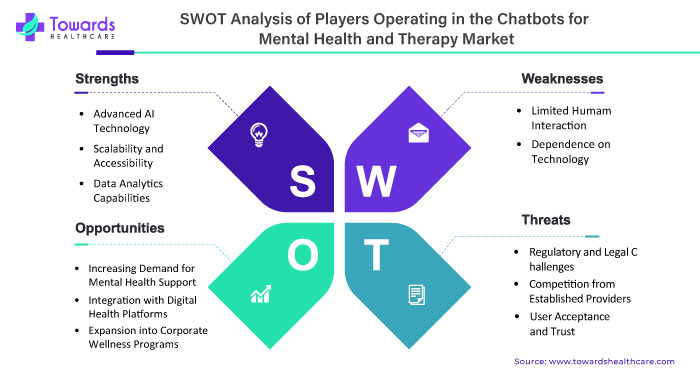
The Future Unveiled: Projecting Towards 2032
As we peer into the future, the trajectory of mental health chatbots seems boundless. Projections indicate a market value eclipsing USD 6.51 billion by 2032, showcasing the sustained demand for innovative and accessible mental health solutions.
Embracing the Transformation: The Way Forward
The surging popularity of mental health chatbots underscores a paradigm shift in how we approach mental well-being. As we embrace this transformative technology, it is imperative to continue pushing boundaries, ensuring that mental health support remains at the forefront of innovation.
In conclusion, the global landscape of mental health and therapy is undergoing a profound transformation, led by the exponential growth of chatbots. From redefining accessibility to leveraging cutting-edge technology, these digital companions are steering us towards a future where mental health support is not just a service but an integral part of our daily lives.

